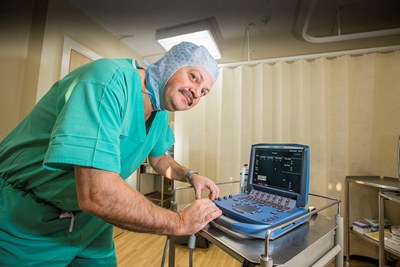
A top surgeon is leading a specialist medical team on a mercy mission to Africa to bring expert care to one of the world’s poorest countries.
Tony Da Silva, a consultant general and vascular surgeon at the Spire Yale Hospital, in Wrexham, and his four colleagues have jetted out to Ethiopia for a nine-day stay.
In that time they will see hundreds of people from one of the most deprived and remote areas of the country.
It is the fourth time that Tony, 56, of Jeffreys Road, Wrexham, has been out to the country which has been ravaged by civil war and famine in the last 30 years.
He has hand-picked a team from North East Wales and Merseyside to treat the kinds of ailments and injuries he knows they will encounter.
He said: “It is very different to the health issues we have here in North Wales – malaria and TB are common and so is HIV and many patients have all three.
“In addition there are a lot of road accidents and lots of burn injuries – roads are unlit, livestock wanders across them while much of the cooking is done on open fires and young children, in particular, often fall into them.
“We will be operating every day we are there and I will be mainly assisting and organising the care.”
Tony, who also works at Wrexham Maelor Hospital, specialises in vascular, or vein, problems and unlike back home there are few cases of varicose veins: “Ethiopians are too active,” he said: “Their general fitness is excellent.
“They don’t seem to get Western diseases. They eat lots of vegetables and fruit and they walk everywhere – they will walk for a week just to get to the hospital to attend one of our clinics.”
Tony and his team, which is made up of Nick Nelhans, a consultant paediatrician, Gill Royce, an orthopaedic sister, and Tom Williams, a resuscitation officer, all from Wrexham Maelor Hospital, and Liz Williams, a paediatric sister from Alder Hey Hospital, Liverpool, face their own trek to get to their patrients.
They will fly into Ethiopia’s capital, Addis Ababa, from Manchester, via Dubai, and then face a seven-hour 250-mile drive along single land roads, stopping for herds of cattle and flocks of sheep to cross.
They will be taking with them some easily transportable specialist equipment but their main asset is their expertise and experience in a country with 91 million people and just one doctor for every 100,000 of them.
They are also taking 100 fluorescent jackets and 200 arm bands to help motorcyclists and child pedestrians be seen on Ethiopia’s rudimentary road system.
It will be carried as part of each person’s 30 kg baggage allowance: “Ethiopia is one of Africa’s most mountainous countries and with most of the land above 8,000 feet, daytime temperatures are 20-25C even though it is close to the Equator.
“That means we can travel light and use our baggage allowances to take over more equipment to help people like a viewing box and a sanitiser.
“We go at this time of year because the temperatures are good and it’s before the rains come in March when travelling becomes much more difficult but it’s an amazing place and the people are wonderful and we are just glad to be able to help them.”
Tony first became involved in charity work after the Pakistan earthquake in 2005 and that encouraged him to take a course in delivering medical care to areas hit by catastrophes.
Since then he has been to Ethiopia every year for the past four years. He and his team pay their own way though they did hold an event at Peckforton Castle in October to raise money for one of the nursing sisters to travel with them.
He said: “I would like to go to other countries as well but I am becoming an expert in Ethiopia and in what they need there so that is where I can be most effective.
“I don’t do much of my own surgical speciality but I can assist other surgeons and last time I did treat a man with an aneurysm in his knee.
“Untreated it could have cost him his leg or even his life if he had bled to death or if infection and gangrene had set in but what they need most is orthopaedic care though it would be good to get a plastic surgeon to treat burn victims.
“We’re taking a nurse with expertise in plastering and an expert in resuscitation but when we get there we will find the hospital’s Accident And Emergency Department will consist of one small room.
“They don’t have the equipment to repair fractures and it’s all done in that one small room in an old-fashioned way so it’s about teaching them those techniques and how to do them well.”
Sue Jones, Hospital and Business Development Manager at Spire Yale Hospital, said: “The voluntary work that Tony and his team do is really inspirational and so important.
“The expertise he has acquired in the course of rhe last four years means he knows what the people in Ethiopia need and because of his experience and his contacts within the medical profession he can put together a team that can deliver.
“They are simply heroes and every year they go out there to save lives and help people.”